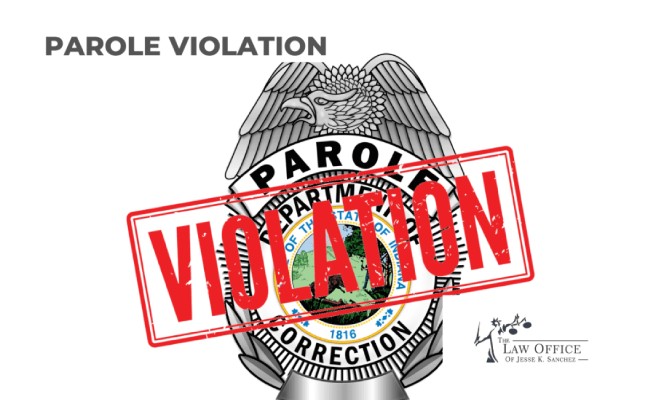Parole is the status an inmate receives after they are released. Before the parolee completes their sentence, the parolee must agree to follow the parole agency rules. Parole violations come in two basic forms. The first are violations of the law, and the second is administrative violations. If you have been accused of violating parole, it is time to speak with a criminal attorney that handles parole violations, the Law Office of Jesse K. Sanchez at (317) 721-9858 or email info@jksanchezlaw.com.
An Experienced Parole Violations Attorney
Most criminal defense attorneys are inexperienced at handling parole violations. Many attorneys think these cases involve just negotiating a plea bargain, like they do in criminal court. However, parole violations are much more complicated than that and require special knowledge on how to handle them.
Parole Violations Defined
Courts usually define parole violations as either direct or technical. A direct parole violation occurs after a court sentences a person while on parole for a new crime. And a technical breach occurs after a court finds that a person violated the rules for their parole. A parole violation occurs when a parolee fails to comply with the conditions and terms of their individual parole. The result of a parole violation can result in another lengthy prison sentence!
An administrative parole violation can be anything including:
- Changing residence without notification
- Failure to report to parole
- Failure to pay court ordered fees
- Failure to make restitution payments
- Testing positive drugs
When a parolee violates, they generally have committed a variety of violations of conditions of parole. Parole can be revoked for any type of breach of the conditions of parole.
Common Parole Conditions
When an inmate is released on parole, they must follow all state and federal laws. In Indiana, parolees are usually required to remain in the state, where the crime was committed. Also, parolees must report to a parole officer on a routine basis. A standard condition of parole is not to violate any laws. If a parolee is accused of breaking the law, they will not get a hearing in front of the parole board until their charge is disposed by:
- Dismissal
- Plea bargain
- Trial
The second type of parole violation is an administrative violation.
An administrative violation occurs when parolees violate certain rules or conditions stated in their parole. Parolees are generally required to do the following:
- Parolees must maintain steady employment
- Parolees must report to a parole officer
- Parolees must notify their parole officer of any change of address
- Parolees must refrain from possessing, using, or administering controlled substances
- Parolees must refrain from possession or control of a firearm or any defensive or deadly weapons
- Parolees must refrain from corresponding with anyone in a correctional facility or on parole or probation
- Parolees must follow any requirements specific to their offense as required by the court
Submitting to random drug testing is also a common condition of parole. Also, parolees are required to waive their Fourth Amendment rights.
Often, parole violations are minor slip-ups that are harmless. There are even some parole violations that are even committed without the parolee realizing that the violation of parole has occurred.
Impact of a Parole Violation
Possible penalties for violating parole include:
- Return to prison to complete the original sentence
- A longer jail or prison sentence
- Fines
- Mandatory community service
- Mandatory time on house arrest
- Mandatory participation in a rehabilitation program
Call a Parole Violation Attorney
Parole violation is something that must be taken very seriously. It is important to speak to an attorney that can assist with your parole violation as soon as possible. Call Indianapolis criminal defense attorney, Jesse K. Sanchez at (317) 721-9858 or email info@jksanchezlaw.com.




